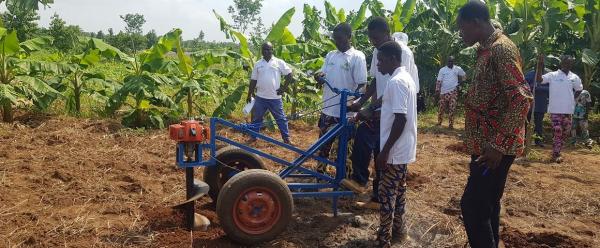Call to action 25 November 2025
- Home
- CIRAD news
- News
- antibiotic resistance in Africa and small livestock farms
Tackling antibiotic resistance in Africa, focusing on small livestock farms
-42.JPG)
Meat production has increased by 64% since 2000 in Africa © Brent Stirton-Getty Images for FAO, CIFOR, CIRAD, WCS
Even though Africa is the continent with the lowest usage of antibiotics in livestock, the data show a high prevalence of resistance in bacteria isolated from livestock and animal products.
Towards policies to address antimicrobial resistance in Africa
A narrative review of the literature along with discussions led by CIRAD and its partners (INRAE, ILRI, IRD and the University of Copenhagen) propose avenues to explain this situation in the Journal of Emerging Infectious Disease. Qualitative interviews with farmers reveal a lack of knowledge about the issue of antimicrobial resistance and an uninformed use of antibiotics. Given the development of livestock farming to meet growing demand for protein, these practices constitute a serious public health problem.
Measures adapted to family farmers
There is a vital need to simultaneously improve access to veterinary drugs while strengthening the regulation of their use in livestock. This requires, among others, incentive and regulatory tools. The scientists call for measures that are adapted to the specific challenges facing family farmers in Africa.
“On the one hand, antibiotic use in large commercial farms must be regulated, and on the other, family farms are struggling to access veterinary drugs and professional veterinary advice. This hampers their capacity to change their health practices, to adopt innovations and to cope with more demanding regulations and production standards”, says François Roger, who was behind this research.
The scientists propose a global approach targeting the agri-food system, including access to training, advice and drugs, as well as innovative technical interventions adapted to family farmers.
As pointed out by Christian Ducrot, “it is important to stress that the effective application of these policies depends on a key factor: minimising adverse health and socioeconomic impacts on the standard of living for farmers, especially in the most vulnerable regions”.
Antimicrobial resistance, a problem that knows no boundaries
Antimicrobial resistance is a global challenge, but is still too often underestimated. This problem of the development of bacteria resistant to antibiotics is mainly due to the overuse of these drugs in livestock farming and aquaculture. It currently causes more than 700 000 human deaths every year.
The World Health Organization has declared antimicrobial resistance to be one of the top ten global public health threats. Last week, the “Global Leaders Group on Antimicrobial Resistance” called for all countries to implement a significant and urgent reduction in the use of antibiotics in global food systems.
* According to official data adjusted by animal biomass



























